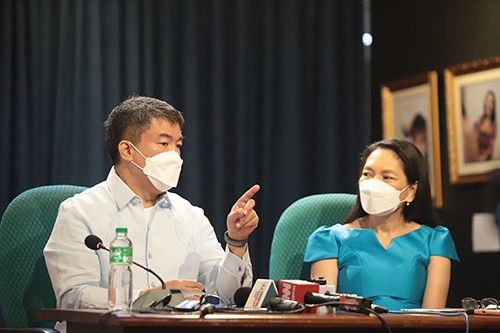
Upgrade to High-Speed Internet for only ₱1499/month!
Enjoy up to 100 Mbps fiber broadband, perfect for browsing, streaming, and gaming.
Visit Suniway.ph to learn
February 23, 2025 | 11:56am
Container vans are seen stacked up next to buildings near the Port of Manila on August 9, 2024.
AFP / Ted Aljibe
MANILA, Philippines — The National Union of Peoples’ Lawyers (NUPL) has expressed concerns over the Philippines’ removal from the Financial Action Task Force’s (FATF) grey list, calling it a “pyrrhic victory” linked to political repression.
In a statement on Saturday, February 23, the NUPL criticized the FATF for congratulating the Philippines without acknowledging the “rampant misuse of counterterrorism financing laws to silence dissent and criminalize civil society.”
“The surge in fabricated terrorism financing cases, arbitrary asset freezes, and instances of financial exclusion are not 'unintended consequences' of compliance; they are deliberate tactics used to satisfy the FATF’s mandates at the cost of human rights,” the NUPL’s statement read.
The lawyer’s group also accused the government of prioritizing the approval of foreign states and financial institutions over the welfare of its own people by aggressively pursuing FATF compliance.
They cited the use of counterterrorism financing (CFT) regulations to target grassroots movements while failing to address large-scale corruption, illicit financial flows and money laundering through Philippine offshore gaming operators (POGOs).
“The state’s eagerness to prosecute trumped-up charges of financing terrorism while ignoring financial crimes committed by politically connected elites exposes the hypocrisy of this so-called victory,” the NUPL said.
The group also criticized FATF’s final remark urging the Philippines to ensure that CFT measures do not "discourage or disrupt legitimate NPO activity," calling it "hollow."
They argued that FATF’s own complicity in enabling such policies has contributed to the restriction of freedom of association, particularly the right to access financial resources.
“The very fact that FATF commends the Philippines on meeting its targets without addressing the abuse of these measures is not just disappointing— it is damning evidence that its processes lack genuine accountability and transparency,” the NUPL said.
“As long as the FATF refuses to engage with civil society, it will continue to serve as a convenient shield for governments to legitimize repression under the pretense of financial integrity,” it added.
Prior to the release of the report removing the Philippines from the grey list, the NUPL sent a report to FTAF raising concerns about the government’s CFT regulations that “are undermining civic space and fundamental freedoms.”
The FTAF announced the exclusion of the Philippines from the grey list on February 21.
"The FATF Plenary congratulated the Philippines for the positive progress in addressing the strategic anti-money laundering and countering the financing of terrorism and proliferation financing deficiencies," the Paris-based watchdog said.
Following the Philippines' exit from the grey list, it will no longer be subject to the watchdog’s increased monitoring, according to FATF President Elisa de Anda Madrazo in a report from The STAR.
According to the FATF, a grey list designation signifies a country's commitment to addressing key strategic weaknesses through an agreed-upon action plan and timeline.
Following the Philippines' exit, Executive Secretary Lucas Bersamin said the move will boost investments in the country.
“Our well-earned exit from the Financial Action Task Force’s (FATF) grey list boosts our drive to attract job-creating, growth-inducing foreign direct investments,” Bersamin said in a statement.
“For so long, our investment attractiveness has been dragged down by this dirty money haven label,” he added.
The Philippines had been on the FATF’s grey list since June 2021 before its removal on Friday.

 3 months ago
28
3 months ago
28



